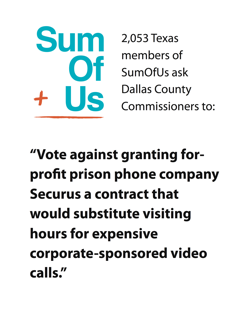Dallas County approves video visitation contract
Today, in a partial reversal, the Dallas County Commissioners Court approved a new contract with jail telephone giant Securus.
by Peter Wagner, November 11, 2014
Today, in a partial reversal, the Dallas County Commissioners Court approved a new contract with jail telephone giant Securus.
In September, after hours of eloquent and unanimous testimony, the County’s legislative body rejected a proposed contract that would have explicitly banned in-person visits at the jail and replaced them with expensive computer visitation. The County voted to reopen the bidding to the previous finalists based on new criteria that would prioritize family communication. The County then discovered — so it says — that this step was prohibited by Texas law, so negotiations with Securus ensued to make changes to their previous proposal.
The new contract drops the mandatory ban on in-person visitation, but maintains a troubling requirement that Securus, in addition to the installation of video visitation machines for incarcerated people to use, builds an on-site video visitation center at a cost of more than $200,000 to be paid for by the families. This is troubling because the only purpose for such machines would be to replace the current system of through-the-glass visitation that the county and its sheriff claim they intend to keep.
County Judge Clay Jenkins, the county’s top elected official, led a strong resistance, calling for more time for public debate and offering a compromise proposal endorsed by Texas CURE, SumOfUs and the Prison Policy Initiative that would have barred the construction of the on-site video visitation center, phased-out the commissions on telephone calls after this year, lowered Securus’s video visitation charge and their deposit fee, and required the contract to automatically include within 30 days any new consumer protections imposed by the Federal Communications Commission.
Unfortunately, Judge Jenkins was unsuccessful at both stopping the contract and winning permission to allow all of the assembled Dallas residents to speak. (Two of the Commissioners voted against extending the time, with one claiming that the issue had received more attention than any other. Judge Jenkins responded that while that was true, unlike other controversial issues, the public and the media were speaking with one voice in opposition to this contract.) Judge Jenkins voted against the contract, but all four of the other commissioners voted to approve the contract today.
However, there were at least four smaller victories today:
- The county forced Securus to offer a per-minute rate rather than a fixed price for each phone call. While the per-call price can sometimes be cheaper for very long calls, in actual use, this pricing structure is more expensive and gives the vendor a financial incentive to “accidentally” drop calls and require expensive reconnection.
- The contract does not ban in-person visits, and the current elected officials are all on record in opposition to banning in-person visits. (We’ll need to carefully monitor the situation to ensure that the county doesn’t directly change course or find more subtle ways to discourage through-the-glass visitation.)
- Judge Jenkins’s fair-minded compromise and the underlying principle on “the gross unfairness of imposing hefty fees on those least able to afford them: the poor who dominate the inmate population” was endorsed by the Dallas Morning News.
- From all of the attention this issue received from Texas public, the media and nationally, it’s clear that almost this entire country — basically everyone who doesn’t have a financial stake in the alternative — thinks that maintaining direct communication between incarcerated people and their loved ones is important. Now that that has been established, it will be much harder for the industry to win further victories elsewhere.




